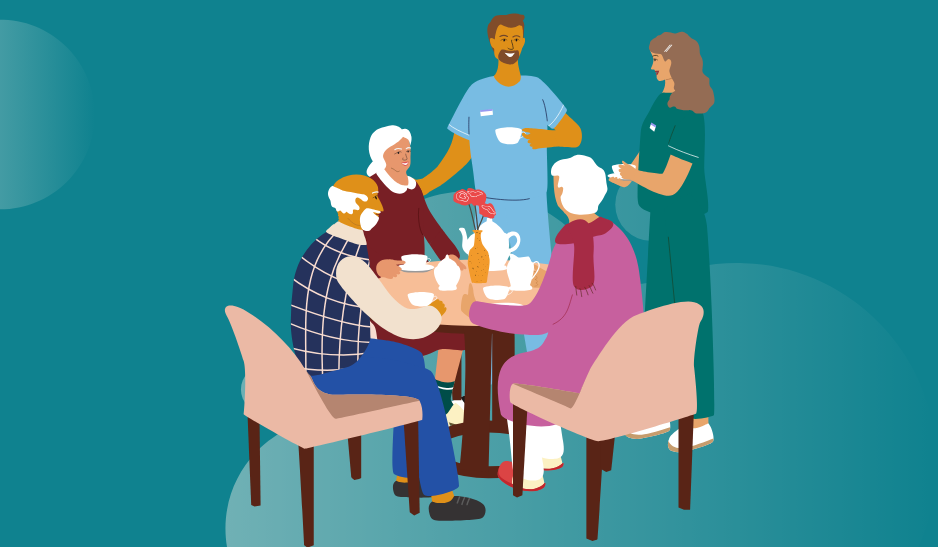Healthcare compliance training touches every part of post-acute care organizations. As regulations tighten and patient privacy standards […]
According to Cedars-Sinai, “[Ageism] can contribute to cognitive decline, more hospital stays, disability, worse health and quality of life, and depression. Over the long term, these attitudes shorten lives.”
Ageism can cause harm to residents in various forms, even when it’s unintentional.
The fear of ageism can cause residents to mask their needs or avoid seeking medical treatment so that they don’t appear weak or ill.
Educating caregivers on how to meet residents where they are and personalize services to individual needs is one significant way to counter ageism and help residents thrive in assisted living communities.
Hearing, vision, and memory challenges are the most common issues that older adults face that cause them to fear ageism. Let’s discuss how to best support residents with these challenges and make them feel at home in their new environment.
Supporting residents with hearing problems
Did you know that 1 in 3 people aged 65-75 have hearing loss?
Caregivers should look for ways to improve the quality of life for residents living with some form of hearing loss. This can look like:
- Knowing if a resident uses a hearing aid, and ensuring that it’s put in properly (and that the batteries work).
- Practicing communication in low-noise environments. When caregivers are talking to residents, they should turn off the TV, radio, or any other devices that are making noise to avoid distractions.
- Talking slowly and clearly. In today’s fast-paced world, it can be tempting to talk fast. Taking your time can help residents feel more confident that they’ve grasped what you are saying and avoid confusion or frustration.
READ MORE: Essential Skills for Assisted Living Caregivers:
Using Communication to Improve Quality of Life
Supporting residents with vision problems
Blindness and cataracts are common as people get older. Caregivers can help residents maintain their quality of life with simple adjustments that make a profound impact.
Here are some strategies that can help:
- Denote vision loss and specific information in resident care plans. When nursing teams adequately describe vision challenges (eg: less vision out of left eye), this can help caregivers when seating residents for meals to have adequate lighting or face them away from glares.
- Ensure adequate lighting in rooms. As you walk around the community, make sure that each area has sufficient lighting. Caregivers can brighten up residents’ rooms as well.
- Develop marketing collateral in accessible, legible fonts and font sizes that are big enough for any prospective resident to read. Including visuals to support the text can increase comprehension.
Supporting residents with memory problems
While some may age with no cognitive decline, many older adults will encounter some form of dementia or cognitive impairment.
Dementia is a progressive, irreversible decline in mental and social functions. It can manifest as short or long term memory loss, behavior challenges, learning issues, and difficulty orienting to time and place.
Strategies and tips for working with this population:
- Address older adults directly. When a resident is in the room, make sure their presence is acknowledged and include them in conversation.
- Utilize non-verbal communication. Demonstrating appropriate body language and facial expressions are key to supporting residents. Utilize hand gestures and eye contact to increase comprehension and make residents feel comfortable during a potentially confusing time.
- Support caregivers alongside residents. Caring for people living with dementia may experience difficult and challenging situations. Engage caregivers with empathy and compassion. This can improve mood, feeling supported, and allow them to re-engage with a resident from a different angle or calmer vantage point.
READ MORE: Managing Agitation and Aggression in Dementia Care: Proven Techniques
Assisted living should feel personal, and your training of caregivers should too!
Personal, consistent, and quality care is the most important part of a resident’s experience. Honor their past and personal interests while acknowledging their current health status.
How caregivers are trained can make a measurable impact on the resident experience, quality of life, and overall better health outcomes. Whether caregivers are assisting a resident with a shower or helping them find the right channel on the TV, each of these interactions is an opportunity to make a resident’s day better.
Empowering caregivers to deliver the best care is essential.
“The training helps me learn how to position clients and use new tools, which is critical because each person is different. The knowledge I’ve gained helps me feel better about the care I am providing.”
- Christy Richards, Home Health Aide, Best of Care
With the right training, assisted living communities can meet and exceed resident standards with high-quality, personalized services that meet their unique needs.





